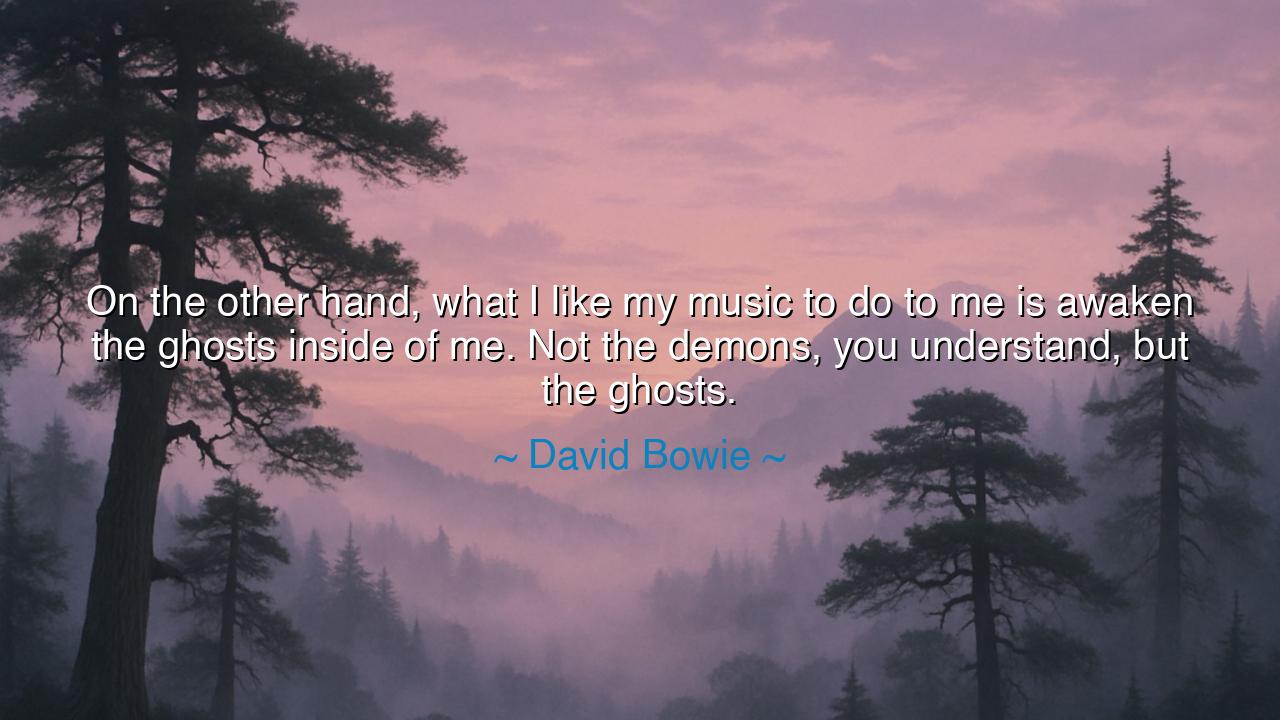
On the other hand, what I like my music to do to me is awaken
On the other hand, what I like my music to do to me is awaken the ghosts inside of me. Not the demons, you understand, but the ghosts.






When David Bowie declared, “On the other hand, what I like my music to do to me is awaken the ghosts inside of me. Not the demons, you understand, but the ghosts,” he revealed the sacred role of music in stirring memory, reflection, and the tender ache of all that has been lived. His words are not about terror or torment, but about communion with the unseen within us: the ghosts of old joys, lost loves, forgotten dreams, and moments etched in the corridors of the soul. He teaches us that music is not only sound for the ear but a lantern that illuminates the hidden chambers of the heart.
The ancients knew this mystery well. The poets of Greece sang of Mnemosyne, the goddess of memory, mother of the Muses. To them, art was born not of the present alone, but of memory—the summoning of what has passed, so it may yet speak again. Bowie’s ghosts are of the same kind: fragments of the self that linger, not to destroy, but to remind us of who we have been, and what shadows shape our being. Demons seek to devour, but ghosts ask only to be acknowledged.
Consider the soldier returning home from war, who hears a simple folk song from his youth. The tune awakens within him the ghosts of childhood, of peace, of innocence once untouched by battle. It does not condemn him, nor does it seek to harm him. Instead, it reawakens the man beneath the scars, reminding him of a wholeness he thought forever lost. This is the power Bowie describes: music reaching deep within, stirring the gentle, lingering spirits of memory that make us human.
Bowie himself was a master of transformation, always reinventing his sound and image. Yet beneath every mask he wore, every persona he embodied, he carried within him these ghosts—echoes of past selves, whispers of experiences that had shaped him. His music was not meant merely to entertain; it was meant to awaken, to stir the listener as it stirred him, calling forth memories and emotions hidden by the noise of daily life. He shows us that music’s greatest gift is not escape, but revelation.
There is a quiet heroism in facing one’s ghosts. Many flee from them, fearing the ache of remembrance, preferring the distraction of noise and spectacle. But Bowie embraces them, inviting them into the room, allowing them to dance with his melodies. In this courage lies wisdom: for to honor the ghosts of our past is to reconcile with ourselves, to be whole. To deny them is to remain haunted forever; to awaken them gently through art is to find peace.
The lesson for us is profound: do not fear the ghosts within you. They are not curses but teachers. Let music, or whatever art speaks to you, serve as the key that unlocks their voices. Listen when an old song moves you to tears, for it is your soul speaking. Welcome the memories of who you were, and let them guide you into who you are becoming. In honoring your ghosts, you learn to live more deeply in the present.
Practically, this means creating space in your life for reflection. Do not merely consume music as background noise—let it speak to you. Choose songs that stir memory and emotion, and sit with what they awaken. Write down the feelings they bring, or create something of your own in response. In this way, you turn remembrance into creation, pain into beauty, and memory into wisdom.
Thus, Bowie’s words endure as a sacred teaching: music awakens ghosts, not demons. It summons not the forces that destroy, but the spirits that remind us of our humanity. To listen in this way is to converse with your own past, to reconcile with your own shadow, and to honor the life you have lived. And so the teaching is this: let music awaken you—not to fear, but to memory, not to torment, but to truth. For in your ghosts lies the story of your soul.






AAdministratorAdministrator
Welcome, honored guests. Please leave a comment, we will respond soon